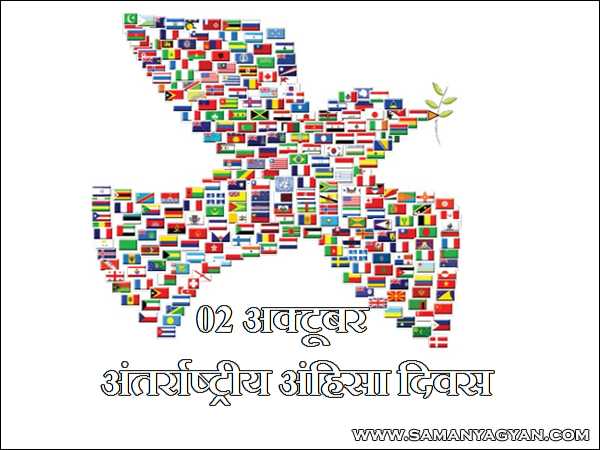International Day of Non-Violence Quick Facts
| Event Name | International Day of Non-Violence () |
| Event Started | 15 June 2007 |
| Event Level | International Day |
| Observed by | United Nations General Assembly |
International Day of Non-Violence Brief
World Non-Violence Day or International Day of Non-Violence is celebrated on 02 October on the occasion of Mahatma Gandhi's birthday. In India, it is celebrated as Gandhi Jayanti.
International Day of Non-Violence History
On 15 June 2007, the United Nations General Assembly voted to establish an International Day of Nonviolence on 02 October. Of the 191 member states of the United Nations General Assembly, more than 140 countries co-sponsored the resolution. These included India's neighboring countries like Afghanistan, Nepal, Sri Lanka, Bangladesh, Bhutan, as well as many countries of the continent of Africa and America.
Recognizing the importance of non-violence in the world order, this resolution was passed unanimously without voting. It was decided to celebrate this day as 'International Day of Non-Violence' to appreciate the contribution of Mahatma Gandhi in promoting the message of peace across the world through the policy of non-violence. That is why every year 02 October is being celebrated as International Day of Non-Violence.
More info about International Day of Non-Violence
Gandhi's Ideology:
Gandhi's philosophy and ideology of truth and non-violence are influenced by the teachings of the Bhagavad Gita and Hindu beliefs, Jainism and Leo Tolstoy's pacifist Christianity. Gandhiji was a vegetarian and a follower of the Hindu idea of celibacy.
They practiced spiritual and practical purity and observed a fast of silence for one day a week. He believed that restraint in speaking brought him inner peace, an effect derived from the Hindu doctrine of silence and peace. After returning from South Africa, Gandhiji gave up wearing western-style clothing, which was associated with his wealth and success.
He favored indigenously woven fabric i.e. Khadi. He and his followers adopted Khadi cloth woven from cotton. He weaved the cloth on his own with the charkha and inspired others to do the same. This spinning wheel was later included in the flag of the 'Indian National Congress'.
Indian Satyagraha:
The Constitution of India gives the right to equality before the law to all citizens of India through Fundamental Rights. It prohibits discrimination on the basis of caste, religion, race, sex or birth and abolishes untouchability. India follows the beliefs of truth and non-violence, as the democratic system of the country represents the ideology of Swaraj.
Mahatma Gandhi used Satyagraha as a means of improving the conditions of these people and providing them social justice, such as universal education, women's rights, community harmony, eradication of poverty, promotion of Khadi etc. Gandhiji had enumerated seven social evils, which are as follows-
- Politics without principles.
- property without labor.
- Bliss without self-consciousness.
- Knowledge without character.
- Business without ethics.
- Science without humanity.
- Worship without sacrifice.
Important Days of October Month - (National Days and International Days):
International Day of Non-Violence FAQs:
International Day of Non-Violence is observed every year on 02 October.
Yes, International Day of Non-Violence is an International Day that is celebrated every year on October all over the World.
International Day of Non-Violence started on 15 June 2007.
International Day of Non-Violence is observed every year by United Nations General Assembly.

